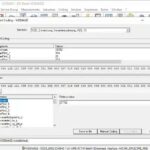Navigating the world of Mercedes-Benz diagnostics can be complex, especially when it comes to selecting the appropriate diagnostic tool. For Mercedes owners and DIY mechanics, the array of available OBD scanners can be overwhelming. This article aims to clarify the options, focusing on tools suitable for various Mercedes models, particularly those requiring a 38-pin diagnostic connector, and help you choose the best Mercedes Diagnostic Tool for your needs.
Understanding Mercedes Diagnostic Ports: OBD-II vs. 38-Pin
Older Mercedes-Benz vehicles, particularly those manufactured before the widespread adoption of OBD-II standards, often utilize a 38-pin diagnostic socket located in the engine bay. This contrasts with newer models, which typically use the standard 16-pin OBD-II port usually found in the driver’s footwell. The 38-pin connector is crucial for accessing all electronic modules in these earlier vehicles, as not all systems are accessible via the later OBD port. This distinction is critical when selecting a mercedes diagnostic tool, as standard OBD-II scanners may not be compatible with the 38-pin system. Accessing data from the 38-pin socket often requires specialized tools and multiplexers to correctly interrogate the different pins and modules.
Diagnostic Tool Options for Mercedes-Benz
When considering a mercedes diagnostic tool, several options are available, ranging in price and capability.
High-End Options: MB Star
The official Mercedes-Benz Star Diagnosis system is undoubtedly the most comprehensive tool available. It offers in-depth diagnostics, coding, programming, and access to virtually all systems within a Mercedes vehicle. For professional garages and serious enthusiasts, the MB Star provides unparalleled functionality. However, its high cost can be a significant barrier for частные users and DIY mechanics. While incredibly powerful, the expense of the MB Star system often leads individuals to explore more cost-effective alternatives for their mercedes diagnostic tool needs.
Mid-Range Scanners: Carsoft MB 7.4 & V12
Carsoft is another brand that has been around for a while in the Mercedes diagnostic arena, offering systems like MB V7.4 and V12. These systems are specifically designed to work with the 38-pin diagnostic socket and aim to provide a more affordable alternative to the MB Star. Carsoft systems typically include both hardware and software necessary for diagnosing older Mercedes models. However, user reviews on Carsoft systems are mixed, with some reporting more favorable experiences with the older V7.4 system compared to the newer V12. It’s crucial to research current user feedback and consider the specific functions needed when evaluating Carsoft as your mercedes diagnostic tool.
Consumer-Grade Scanners: iCarsoft & Foxwell
For users seeking a balance between functionality and affordability, brands like iCarsoft and Foxwell offer a range of mercedes diagnostic tool options. iCarsoft, with tools like the MB V2.0 and V3.0, primarily focuses on OBD-II compatible vehicles. While iCarsoft may not directly support the 38-pin socket with those specific models, they are popular for newer Mercedes vehicles. Foxwell, particularly the NT530 Pro, is often cited as a well-regarded option that can sometimes be found with 38-pin adapter capabilities, although availability in certain regions like the UK may vary. These scanners typically offer a good range of diagnostic functions, including fault code reading, live data, and some special functions, making them suitable as a mercedes diagnostic tool for DIY maintenance and fault finding.
Subscription-Based Tools: Carly
Modern, subscription-based tools like Carly represent another approach to Mercedes diagnostics. Carly often utilizes a Bluetooth OBD-II adapter and a smartphone app, offering a user-friendly interface and a range of diagnostic and coding functions. While convenient and regularly updated, the subscription model and potential limitations in accessing older vehicle systems should be considered. For owners of newer Mercedes models, Carly can be a compelling and user-friendly mercedes diagnostic tool, but its compatibility with 38-pin systems needs to be verified depending on the specific adapter and software version.
Key Considerations When Choosing a Mercedes Diagnostic Tool
Selecting the right mercedes diagnostic tool depends on several factors:
- Vehicle Age and Diagnostic Port: The most crucial factor is whether your Mercedes uses a 38-pin or OBD-II port. For older models with 38-pin connectors, ensure the tool explicitly supports this connection type.
- Budget: Mercedes diagnostic tools range significantly in price. Determine your budget and weigh it against the features and capabilities you require.
- DIY vs. Professional Use: DIY mechanics may find consumer-grade scanners sufficient, while professional garages will likely need the comprehensive capabilities of systems like MB Star.
- Functionality Needs: Consider the diagnostic functions you need. Basic fault code reading may be sufficient for some, while others may require advanced functions like coding, programming, and live data analysis.
Choosing the appropriate mercedes diagnostic tool is essential for effective maintenance and repair of your Mercedes-Benz. By understanding the differences between diagnostic ports and the various tool options available, you can make an informed decision that meets your specific needs and budget.
